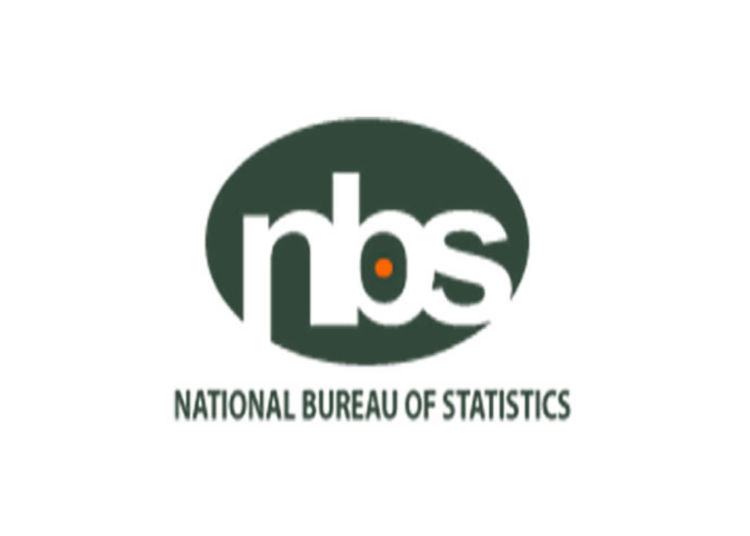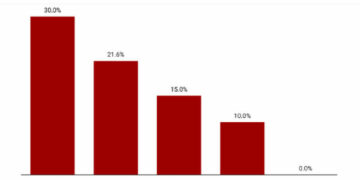Nigeria’s non-oil sector has continued to demonstrate resilience, sustaining its role as the main driver of economic activity and signalling a gradual shift away from the country’s historical dependence on oil.
Fresh data from the National Bureau of Statistics (NBS) released on Monday show that the non-oil economy accounted for 95.95 per cent of total Gross Domestic Product (GDP) in real terms in the second quarter of 2025.
According to the report, the overall GDP expanded to 4.23 per cent year-on-year during the period, an improvement on the 3.48 per cent recorded in the second quarter of 2024 and higher than the 3.13 per cent posted in the first quarter of 2025.
The agriculture sector grew by 2.82 per cent, up from 2.60 per cent in the same quarter of 2024, while industry recorded a robust growth of 7.45 per cent, compared to 3.72 per cent a year earlier. Services also expanded by 3.94 per cent, slightly higher than the 3.83 per cent growth seen in the second quarter of 2024.
In terms of contribution to GDP, the industry sector accounted for 17.31 per cent in Q2 2025, up from 16.79 per cent in the corresponding period of 2024. Aggregate GDP at basic prices in nominal terms stood at ₦100.73 trillion, representing a year-on-year nominal growth of 19.23 per cent compared to ₦84.48 trillion in the second quarter of 2024.
The non-oil sector grew by 3.64 per cent in real terms during the quarter, up from 3.26 per cent in Q2 2024 and 3.19 per cent in Q1 2025. Key growth drivers included crop production, telecommunications, real estate, financial institutions, trade, construction, and electricity, gas, steam, and air conditioning supply.
Despite its smaller share of the economy, the oil sector recorded notable growth. Real GDP in the sector expanded by 20.46 per cent year-on-year, up from 10.08 per cent in the corresponding quarter of 2024 and a sharp rebound from 1.87 per cent in Q1 2025. On a quarter-on-quarter basis, growth stood at 6.01 per cent.
Oil contributed 4.05 per cent to real GDP in Q2 2025, higher than the 3.51 per cent recorded in Q2 2024 and 3.97 per cent in Q1 2025. Average daily crude oil production rose to 1.68 million barrels per day (mbpd), compared to 1.41 mbpd in Q2 2024 and 1.62 mbpd in Q1 2025.
The trade sector posted strong nominal growth of 43.83 per cent year-on-year in Q2 2025, up from 34.34 per cent in the same quarter of 2024. On a quarter-on-quarter basis, the sector surged by 78.96 per cent. Trade contributed 25.93 per cent to nominal GDP in the period, compared to 21.49 per cent a year earlier and 15.52 per cent in Q1 2025.
However, trade grew modestly by 1.29 per cent, lower than the 1.82 per cent recorded in Q2 2024 and 1.78 per cent in Q1 2025. Its contribution to GDP stood at 18.28 per cent, down from 18.81 per cent a year earlier but slightly higher than the 18.21 per cent recorded in the preceding quarter.
The manufacturing sector showed mixed performance. Nominal growth slowed to 4.51 per cent year-on-year, down from 7.65 per cent in Q2 2024 and sharply lower than the 42.40 per cent posted in Q1 2025. Quarter-on-quarter, the sector contracted by 31.72 per cent.
Commenting on the GDP figures, Dr Muda Yusuf, chief executive of the Centre for the Promotion of Private Enterprise (CPPE), noted that while they show that Nigeria’s economy is on a steady recovery path, more productivity, particularly from the non-oil sector, is needed to boost revenue.
Yusuf, while noting that the country’s GDP growth rose to 4.23 per cent in the second quarter of 2025, compared to 3.13 per cent recorded in the first quarter, described the performance as “remarkable,” noting that it reflects the impact of government policies aimed at stabilising the economy.
“The GDP numbers point to the fact that the economy is on a recovery path. You can see that there’s an improvement in the GDP figures compared to what we had in Q1. In Q1, GDP growth was 3.13 per cent. In Q2, it rose to 4.23 per cent.
“This is quite remarkable and shows that a number of government policies are actually on course. Particularly striking is the dramatic improvement in the oil and gas sector, which posted growth of 20.46 per cent, compared to 7 per cent in Q1. This is evidence that some of the oil and gas sector reforms are beginning to yield results.
Agriculture, Manufacturing, ICT sectors sluggish
But Dr Yusuf remarked that not all the key sectors did that well in the period under review, noting that some actually contracted rather than grew.
He went on: “However, we need to worry about the fact that some critical sectors of the economy are still slow and sluggish in their recovery. For instance, the agricultural sector grew by 2.2 per cent. Although this is an improvement over the 0.07 per cent recorded in Q1, given the critical nature of agriculture, a lot more still needs to be done. I believe the government is already working in this direction to generate stronger momentum in the sector.
“The manufacturing sector is also sluggish. In fact, it slowed slightly in Q2, with a growth rate of 1.68 per cent, compared to 1.69 per cent in Q1. This slight deceleration indicates that the manufacturing sector is still grappling with many structural challenges.
“Another concern is that the textile sector remains in recession, and has been for quite some time.
“On the positive side, the air transport sector, which had also been in recession for a while, has now recovered. It posted GDP growth of 6.34 per cent, which is commendable.
“The trade sector and ICT sector, however, slowed. Motor vehicle assembly actually contracted in Q2, which is worrying. As mentioned earlier, the manufacturing sector also slowed, meaning there’s still a lot of work to be done.”
Services sector still dominant
The economist expressed the belief that things are generally looking up for the economy.
“Nonetheless, the economy is generally on course. The structure of the economy has not changed dramatically. In terms of sectoral contributions: agriculture contributed 26.17 per cent; industries, 17.13 per cent and services remained dominant, contributing 56.53 per cent.
“The non-oil sector contributed 95.95 per cent, compared to just 4.0 per cent from the oil sector. This shows that the economy is largely driven by the non-oil sector. What we need now is to ensure greater productivity in this sector, so that beyond contributing to GDP, it also contributes significantly to government revenue and quality job creation.”
In real terms, manufacturing grew by 1.60 per cent, higher than in Q2 2024 but slightly below the 1.78 per cent posted in Q1 2025. Its contribution to real GDP fell to 7.81 per cent, compared with 8.01 per cent in Q2 2024 and 9.62 per cent in Q1 2025.
The mining and quarrying sector, which includes crude petroleum, natural gas, coal mining, metal ores, and other minerals, grew nominally by 4.61 per cent year-on-year. Quarrying and other minerals led with a 50.41 per cent expansion, followed by coal mining at 32.59 per cent.
In real terms, the sector recorded 20.86 per cent growth, significantly higher than the 7.51 per cent in Q2 2024 and 2.97 per cent in Q1 2025. Its contribution to real GDP stood at 4.23 per cent, compared with 3.64 per cent in Q2 2024 and 4.22 per cent in Q1 2025.
The information and communication sector maintained its position as a key driver of non-oil growth. It expanded by 6.61 per cent year-on-year in real terms, up from 4.38 per cent in the same quarter of 2024. On a quarter-on-quarter basis, the sector grew by 9.58 per cent. Its contribution to GDP rose to 11.18 per cent, compared with 10.93 per cent in Q2 2024 and 10.59 per cent in Q1 2025.
The finance and insurance sector grew at 63.66 per cent in nominal terms (year-on-year), with the growth rate of financial institutions at 65.24 per cent and a 53.00 per cent growth rate recorded for Insurance. The overall rate was higher than
Q2 2024 by 30.96 percentage points, and higher by 42.65 percentage points than the preceding quarter. The quarter-on-quarter growth was 59.54 per cent.
The sector’s contribution to the nominal GDP was 4.57 per cent in Q2 2025, higher than the 3.33 per cent it represented a year earlier and higher than the contribution of 3.07 per cent it made in the preceding quarter.
Real-term growth in the sector totalled 16.13 per cent, up 15.83 percentage points from the rate recorded in the 2024 second quarter and 1.09 percentage points from the rate recorded in the preceding quarter. Quarter-on-quarter growth in real terms stood at -7.13 per cent.
The contribution of Finance and Insurance to real GDP totalled 3.23 per cent, higher than the contribution of 2.89 per cent recorded in the second quarter of 2024 by 0.33 percentage points, and lower than 3.60 per cent recorded in Q1 2025 by 0.38 percentage points.





